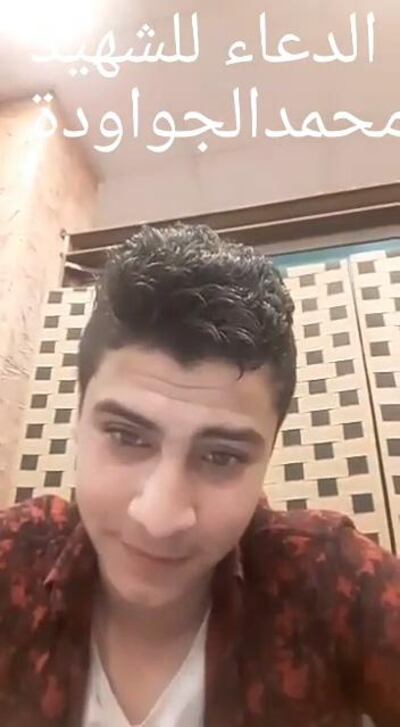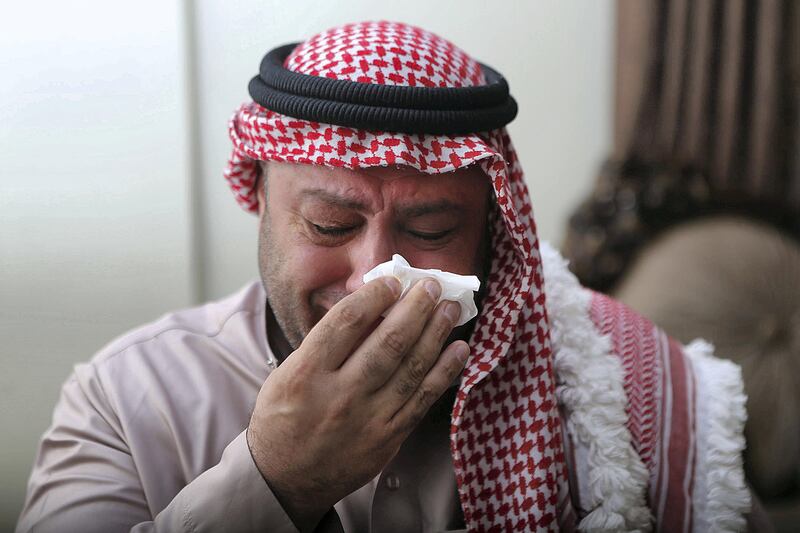Zakaria Al Jawawdeh recalls the last phone conversation he had with his son Mohammed, perhaps minutes before four gunshots tore into his chest and killed him.
“He told me he finished installing the bedroom [furniture] and that the driver went to get a cordless drill from the pickup truck. I then called the driver and told him that they both needed to head right away to the showroom because I needed their help with work.”
But Zakaria says he still does not understand what happened to his 16-year old son after he hung up on the evening of July 23.
An Israeli security guard — Ziv Moyal — shot Mohammed Al Jawawdeh dead, after the two men argued over the delivery and installation of furniture at a residential building leased to the Israeli embassy in Amman, according to a police report.

Al Jawawdeh attacked and wounded the guard, who responded by shooting the teenager and also the Jordanian landlord of the property in the compound of the Israeli embassy, Bashar Hamarneh, who was standing next to him. Hamarneh, an orthopaedic surgeon, later died in hospital.
Two hours after the last call with his son, Zakaria, 45, a father of seven, who owns a furniture showroom in eastern Amman, was worried sick.
He knew Mohammed had finished installing the set of bedroom furniture — a bed, a closet and two side tables worth 750 Jordanian Dinars (Dh3,900) — at the apartment. He said he sold the furniture to a Jordanian customer and did not know that it was intended for a property linked to the Israeli diplomatic mission.
___________________
Read more:
Jordan presses Israel to prosecute embassy guard who killed two Jordanians
Jordanian protesters demand closure of Israeli embassy
___________________
“I called my son and the driver, but their phones were turned off,” he says. “I called the janitor of the building and asked him about them. He told me everything is chaotic. There was a shooting and killings and that your son is in hospital. Then his phone was disconnected.”
The shooting of the two men has angered Jordanians, many of whom are of Palestinian origin and remain opposed to a peace treaty the country signed with Israel in 1994.
The embassy incident also stoked tensions running high over Israeli security measures at Al Aqsa mosque compound in Jerusalem, of which Jordan is the custodian.
“My son is a martyr,” Zakaria says, choking back his tears. “Look at my son. He has a weak build. He did not even grow a moustache. It is true that all eyes are on Aqsa … but my son would not do it,” he says, in response to Israeli reports that his son attacked the guard with a screwdriver. “He does not have an extremist ideology, he did not belong to any political party. I expect that when the [guard] saw the toolbox he killed my son.
“Why did he shoot him four times in the chest. He could have shot him in his foot.
“But they are cowards, they fear for their souls as much as we love to die. Don’t you like martyrdom? They love life. There is a huge difference between them and us.”
The guard who killed Mohammed was allowed to leave Jordan, along with the rest of the embassy staff, because he was covered by diplomatic immunity.
Mr Netanyahu's embrace of the shooter on his arrival in Israel added to Jordanian anger over the deaths.
It also drew a strong public response from Jordan's King Abdullah, who criticised Mr Netanyahu on Thursday and demanded that the guard face justice.
King Abdullah offered his condolences to both families. His strong criticism of Mr Netanyahu and insistence that justice be served have helped ease public anger over the shootings that might have spiralled into dangerous protests in a country already buffeted by violence engulfing the region.
Internally, Jordanian public anger had already reached boiling point over Israel and its handling of Al Aqsa crisis. The kingdom is also struggling with unemployment peaking at a record high in 11 years, while its southern Bedouin tribes continue to fume over a court ruling of a local soldier sentenced to life for killing three US special forces last November, despite footage showing that he deliberately stalked and shot them dead.
In his comments on the embassy shooting, King Abdullah insisted his country would not compromise the rights of its sons and said "we will devote every possible effort to ensure justice is served”.
Last week, the Jordanian foreign ministry handed Israel the findings of a public prosecution investigation into the incident, and asked for the guard to be prosecuted in Israel in line with article 31 of the Vienna Convention on diplomatic relations.
Jordan also charged him in absentia with two counts of murder and for possessing an unlicensed weapon. Israeli media said Israel's internal security service Shin Bet is investigating the shooting.
Zakaria said nothing will quench his sorrow and the unimaginable grief he is suffering.
“I am only asking for justice to be served,” he said. “The minimum is a life prison sentence.”
Months before his death, Mohammed said he wanted a wedding just like his brother’s who got married three months ago.
“He wanted everyone to hear about his wedding, but he got that in his funeral … He was buried in the grave that I have saved for myself.”





